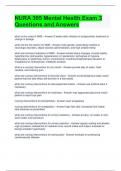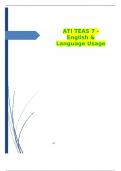NURA 305 Mental Health Exam 3
Questions and Answers
when is the onset of NMS - Answer-2 weeks after initiation of antipsychotic treatment or
change in dosage
what are the risk factors for NMS - Answer-male gender, preexisting medical or
neurologic disorders, depot injection administration, and high ambient temp
what are imminent indicators of NMS - Answer-mental status changes, muscle rigidity,
hyperthermia, tachycardia, hypertension or hypotension, tachypnea or hypoxia,
diaphoresis or sialorrhea, tremor, incontinence, creatine phosphokinase elevation or
myoglobinuria, leukocytosis, metabolic acidosis
what is a nursing intervention for dry mouth - Answer-provide sips of water, hard
candies, and chewing gum
what are nursing interventions for blurred vision - Answer-avoid dangerous tasks; teach
patient that this side effect will diminish in a few weeks
what are nursing interventions for decreased lacrimation - Answer-use artificial tears if
necessary
what are nursing interventions for mydriasis - Answer-may aggravate glaucoma; teach
patient to report eye pain
nursing interventions for photophobia - Answer-wear sunglasses
nursing interventions for constipation - Answer-high fiber diet; increased fluid intake;
take laxatives as prescribed
what are nursing interventions for urinary hesitancy - Answer-privacy; run water in sink;
warm water over perineum
what are nursing interventions for urinary retention - Answer-regular voiding and wheber
urge is present; catheterize for residual urine; record intake and output; evaluate for
benign prostatic hypertrophy
what are nursing interventions for tachycardia - Answer-evaluate for preexisting
cardiovascular disease
,what is cholinergic rebound - Answer-abrupt discontinuation of the drugs causes
extrapyramidal symptoms
what are the types of ASD - Answer-autism and asperger syndrome
what is asperger syndrome - Answer-age appropriate language and intelligence but also
have severe and sustained impairment in social interaction and restricted, repetitive
patterns of behavior, interests, and activities
what are symptoms of ASD - Answer-impairment in social communication and social
interaction with others. uneven pattern of intellectual strengths and weaknesses. rigid in
manner, intolerant of change, and prone to behavioral outbursts in response to
environmental demands and changes in routine. delayed and deviant language
development. echolalia. extremely literal in interpretation. repetitive rocking, hand
flapping. specific interests.
what is the prevalence of ASD - Answer-1 in 54 children. 4-3 times more likely in boys.
found in al groups.
what are risk factors for ASD - Answer-genetic. 80% hereditability. children born to older
parents. fragile X syndrome or tuberous sclerosis, and the use of prescription drugs
valproic acid and thalidomide during pregnancy.
how do children with ASD interact during playtime - Answer-difficulty interacting with
peers, especially in imaginary play situations without supervision and clear rules
how do you treat ASD - Answer-designing academic, interpersonal, and social
experiences that support the childs development. outpatient services may include family
counseling, home care and medication. MUST collaborate with the family! treatments
and outcomes will vary with the individual
what are the common interventions for ASD - Answer-safety is always the priority
a structured physical environment is important
structured schedules with routine and consistent rules are necessary
reward systems for positive behavior helps to lower negative behavior
learn how to avoid/react to triggers
what is medications role in treating autism - Answer-no medication can treat core social
and language deficits but atypical antipsychotics can treat the irritability. no traditional
mood stabilizers or anticonvulsants
what are good psychosocial interventions - Answer-build on their strengths and use
positive reinforcement.
promote interaction using nonverbal interactions.
ensure predictability and safety.
, what is personality - Answer-a complex pattern of characteristics, largely outside of the
persons awareness, which comprise the individuals distinctive pattern of perceiving,
feeling, thinking, coping, and behaving
what are personality traits - Answer-prominent aspects of personality that are exhibited
in a wide range of social and personal contexts.
what is a personality disorder? - Answer-diagnosis is based on abnormally inflexible
behavior patterns of long duration- traced to adolescence or early adulthood- that
deviates from acceptable cultural norms. it incudes maladaptive behavior
what is paranoid personality disorder - Answer-a long standing suspiciousness and
mistrust of people in general. individuals with these traits refuse to assume personal
responsibility for their own feelings, assign responsibility to others, and avoid
relationships where they are not in power. unforgiving and hold grudges. angry and
hostile. cold, sullen and humorless. strong predictor of aggression. do not seek mental
health care
what is psychosis - Answer-a state in which a person experiences hallucinations,
delusions, or disorganized thoughts, speech, or behavior, is the key diagnostic factor in
schizophrenia spectrum disorders.
what are hallucinations - Answer-perceptual experiences that occur in the absence of
actual external sensory stimuli and may be auditory, visual, tactile, gustatory, or
olfactory.
what are delusions - Answer-erroneous fixed, false beliefs that cannot be changed by
reasonable argument. they usually involve a misinterpretation of experience and are
unchanged by reasonable arguments
what is the most common example of disturbed sensory perception in schizophrenia
patients - Answer-hallucinations
what is the most common type of hallucinations - Answer-auditory
what is indirect evidence of schizophrenia - Answer-pauses during conversation in
which the individual seems preoccupied or appears to be listening to someone other
than the interviewer, looking towards perceived source of a voice, or responding to the
voices in some manner.
what are bizarre delusions - Answer-those beliefs that are impossible, illogical, and not
derived from ordinary life experiences.
what are nonbizarre delusions - Answer-themes of jealousy and persecution and are
derived from plausible life experiences.





